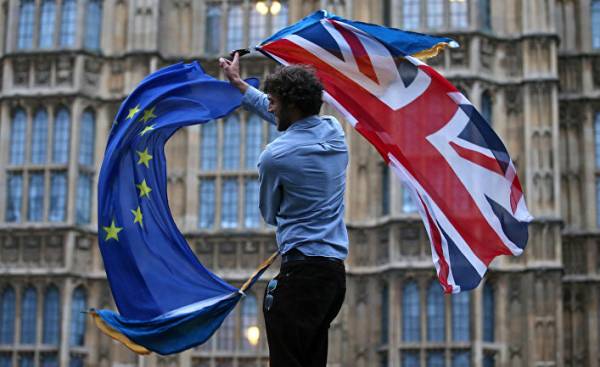
Option full English Breccia disappears. Now before you leave the European Union, the British government wants to “transition period” during which the United Kingdom will retain the commercial rights associated with EU membership, while maintaining contributions to the EU budget, compliance with EU rules and court decisions, as well as the free movement of people. This period will last at least two years starting from March 2019 — the official deadline for completion of the process of Breccia — this means that by 2021 the UK will essentially be the member state of the EU without any right to vote.
Meanwhile, the government of Prime Minister Theresa may, promised to preserve the “deep and special” relations with Europe, try to negotiate a new “legal agreement” with the EU. However, Britain is quite little chance to sign a new contract in such a short time.
Undoubtedly, the onset of 2021 the United Kingdom will still rush to “cliff edge”: a complete break with Europe without alternative options to mitigate the impact. In political terms, this moment in time would create even more risks for the government may, than today, since the next General election will have to go through to June 2022. Therefore, the UK may try to extend the transitional period beyond 2022. And, guided by past experience, we can say that after the first postponement it may never end.
The impression that the UK is coming to the scenario that I outlined three months ago. The fateful decision may to hold early elections in June has allowed its opponents to demand that Britain organized the talks on a transitional agreement, similar to that Norway as a member of the European economic area (EEA). Initially, the CES was established in 1994 as a temporary structure for different countries, accession to the EU. However, since 11 months, Norwegian voters rejected a referendum on EU membership, the EEA was delayed for another 24 years and continues to exist.
No one can predict what will happen in 24 years. However, the good news for Britain is that the EU may already moving towards a two-tier structure. To thrive, the Eurozone will need to create a political Union. This leads to the fact that countries outside the Euro area such as Denmark, Poland and Sweden, form the external level of economic cooperation outside the Eurozone. These countries have membership in the single market, but not in a monetary or political Union.
A two-tier Europe will be very different from your current “two-speed” model. In the past, each country is theoretically moving toward “ever closer Union”, only at different speeds. In contrast to this scenario, if there are two levels of cooperation Britain could comfortably re-join to the outer layer along with Norway and possibly Switzerland.
Now let’s talk about the bad news. The transitional agreement for the UK may not be acceptable for the governments of the EU and for British voters. Proponents of federalism in the EU want Britain as quickly as possible made the choice, because it has long been provided to other countries — such as Denmark, Poland and Sweden — cover for resistance to deeper integration.
Fanatics of federalism hate the idea of a two-tier Europe. They want to force all member States of the EU to adopt the Euro in the next decade and incorporate them into a full-scale political and fiscal Union on a permanent basis. And they rightly believe that to achieve this goal will be easier if you remove from the equation the UK.
However, the transition is not a panacea for the UK. The British have already begun to see the economic costs of Brexia, as an international company, which once used Britain as a hub for its European operations, began to reallocate some of its processes. Because the UK government is trying to maintain the appearance of a strictly time-limited transition, this process will accelerate. Moreover, the EU will use the transition period to change its own rules to force the enterprises, generating employment and large tax revenues go to the territory of the EU.
For example, the European banking authority and the European medicines Agency has already peredoziruet from London, and this means that many legal, administrative and lobbying jobs associated with highly regulated activities such as Finance and pharmaceutical research, will also have to relocate. Thus, the transitional period will lead to the fact that international companies based in the UK will face a “double regulatory Commission”: they will have to simultaneously submit to the whims of the British and European bureaucracy.
What’s worse, the promise of a long transition can delay the shift in public opinion is necessary in order to cancel Brakcet until it was too late. After March 28, 2019, the UK is officially out of the EU, where economic growth has started to overtake the British. If she ever wants to be again adopted, it will have to be content with much less attractive terms than it is today. Not only that, she will no longer receive budget discounts and special treatment in matters of social rules, it can even force it to accept the Euro.
Even 48% of British voters who voted in favor of EU membership, may reject these humiliating conditions. In this case, Britain would be stuck in limbo like Norway but without petroleum wealth or social cohesion. As expressed by the official representative of the labour party, semi-permanent transitional period, based on the “Norway model”, will turn the country into a “vassal state”. She will continue to pay large sums of money to the EU budget and adhere to its laws, but it will not have the right to speak about how the money is spent or how those laws are made.
In the coming months, the British public may begin to anticipate this humiliating endgame. The Norwegian model does not satisfy any elderly residents of the UK or the provincial europhobia, no young urban voters who want to preserve the rights of EU citizenship, which they took for granted my whole life.
With this depressing prospect, the British electorate can change its mind about Brexia before their leaders will go through it. However, this sudden conversion, as happened with the Apostle Paul on the road to Damascus, became possible, the country would experience a political or economic crisis, large enough to shake public opinion and to snatch him out of his fatalistic complacency. Anyway, the Brits are following their favorite national slogan: “Keep calm and carry on in the same spirit.” So, before the Affairs of great Britain will start to improve, they will likely have much worse.







